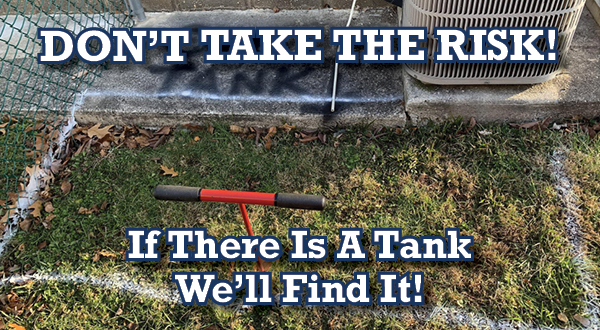Oil Tank Sweep
An oil tank sweep is the best way to locate buried oil tanks. Improperly abandoned underground oil tanks are a financial liability and hazard. ATS is the only company in NJ that guarantees our tank sweep results! Call to schedule now.
Oil Tank Sweeps in NJ
Oil tank sweeps protect NJ residents and potential homebuyers from the dangers of an old, decaying oil tank located underground. ATS Environmental offers comprehensive oil tank sweeps in adherence to federal regulations to protect homeowners in the state of New Jersey.
Signs You May Need a Professional Oil Tank Sweep
- If a home or commercial property was built before the mid-1970s, an underground tank could be present even if it has since been converted to a natural gas heat source.
- If an aboveground tank is present, that may suggest an underground oil tank previously existed on the premises.
- Capped oil tank fill pipes or vent pipes may be visible around the property.
- Extra pipes or lines may enter the building from the outside that do not appear to serve and current use. These are often located around walls in a basement, cellar or crawl space.
If any of the above conditions exist, there is a strong possibility that there may be an undisclosed buried oil tank on the property. A professional tank search inspection will find out whether a tank is present either way
NJ Oil Tank Sweeps and the Risks Associated With Abandoned Underground Oil Tanks
As a homeowner or aspiring homeowner, you’ve likely thought about the multitude of risks you may encounter when purchasing a new home. Fire, wind, water, vandalism – all of these elements may pose significant risks to the integrity of your home and health. But what about oil tank leaks?
Thousands of homes across New Jersey contain decaying oil tanks buried underground that can contaminate soil and water and flood their surrounding environment with toxic substances. An oil tank sweep is the best way to locate buried oil tanks that you may or not be aware of in your yard.
Oil tank sweeps in NJ check for existing oil tanks and leaking underground storage tanks (LUST) in your home’s yard. These tank search inspections protect you from liabilities and hazards that can arise from exposure to toxic substances that may seep from these tanks. Improperly abandoned underground oil tanks are a financial liability and health hazard.
Unfortunately, oil tank leaks are among the top contributors to underground water pollution and other environmental and health issues in the United States. Due to raising awareness regarding the risks of oil tank leaks, oil tank sweeps are becoming a routine home inspection for new homebuyers. An oil tank sweep can directly protect you, your loved ones, and your community from the potential dangers of underground oil tanks that have eroded or begun leaking.
Why Perform an Oil Tank Sweep?
Leaking, decaying, or improperly contained underground oil tanks pose significant threats to humans, other organisms, and the LUST’s overall environment. An underground leaking oil tank can leave humans and the environment vulnerable to health risks and other dangers. In fact, in the past many oil tanks were improperly abandoned or decommissioned throughout New Jersey, left leaking into the surrounding soil or otherwise creating unsafe conditions. As such, almost all NJ towns take the presence of oil tanks very seriously and adhere to specific NJDEP regulations. It is entire possible that a buried tank can exist on a property without the seller having any knowledge, so it is important that buyers perform the due diligence of an oil tank scan before it becomes their own problem to deal with. An oil tank removal can be expensive and soil contamination from a leaked oil tank can be even more costly – sometimes exceeding $10,000 in remediation costs in New Jersey! Even worse, most homeowner’s insurance policies specifically refuse coverage of any costs related to leaking oil tanks. To prevent potential hazards and long-term financial losses, environmental agencies and contractors like ATS Environmental can perform an oil tank sweep inspection.
NEED A PROFESSIONAL OIL TANK SEARCH?
How Contractors Perform Oil Tank Sweeps & Sweep Inspections
A contractor with significant experience in locating undisclosed tanks underground may perform their oil tank sweep with a special metal detector or a ground-penetrating radar (GPR) device. These highly effective technologies allow experts to identify undisclosed underground tanks, spot potential leaks, and take the necessary measures to ensure the property is safe for you to live on. Whether you are buying or selling a home, be sure to consider oil tank sweeps and oil tank inspections to limit your financial liability and protect your health.
Preserve Your Safety
As of September of 2021, states confirmed 564,767 releases from underground storage tank (UST) systems. In other words, over a half-million leaks, spills, and overfills from UST systems have been identified and documented. These leaks, spills, and overfills can threaten human health and safety, considering USTs often hold hazardous substances and toxic chemicals.
Even fumes and vapors from these leaking, spilling, or overfilling UST systems can collect in areas such as basements, utility vaults, parking garages, and other enclosed spaces. Sometimes, these fumes can cause fires or explosions and may pose severe threats to someone’s health if they breathe in these fumes.
For these reasons, it’s vital to have an oil sweep performed in your yard before investing in a home. Investing in an oil sweep will protect the health and wellbeing of you, your family, and any other residents in your home.
Protect Your Investment With These Steps
Abandoned underground oil tanks can be left undetected on a property for many years and be passed from owner to owner. Regardless, once a tank is found there is no way to prevent the need to address it and adhere to vigorous NJ regulations. To protect your purchase, it is important to perform a tank search for the presence of underground oil tanks before closing on a home. An experienced NJ realtor will advise you do this along with any other regular property inspections. Here’s what to do:
1. Get an oil tank scan: A specialized and licensed environmental company should be able to schedule a tank sweep within a matter of days. If the company finds one of these tanks, you may wish for your contractor to perform an oil tank inspection.
2. Choose an experienced contractor: Many home inspection companies do not have significant experience in finding oil tanks on both residential and commercial properties. Be sure to choose the right professionals for your tank search, and always ensure they have proper insurance.
3. Always get a written report: Make sure you get a detailed oil tank sweep report to keep for your records. The report should clearly state whether or not a tank was found, and give details as to the locations that were searched.
Contact Us to Schedule Your Oil Tank Sweep
Did you know that ATS is the only company in New Jersey that guarantees our oil tank sweep results? We’re so confident that our highly trained experts will find detect the presence of any tank on your property that we back it up with full financial protection if one is ever found on your property in the future. We offer fast scheduling and same-day tank sweep results. Contact us now to set up your appointment!
Why Use ATS For This Service

20 Years of Experience
ATS has performed more than 25,000 search services for clients in the past 20 years.

Certified and Highly Trained Experts
ATS sends highly trained experts that carry special inductive and conductive locators (sophisticated metal detectors) and probes that can identify tanks buried underground or beneath driveways.

Detailed Reporting
Our report includes detailed site findings and recommends the steps you should follow to avoid inheriting a potential environmental problem. In addition, our field experts will physically mark the area at the property if it presents a potential environmental risk.
Related Services

Underground Oil Tank Inspections
Comprehensive inspections for underground storage tanks, heating oil tanks and aboveground storage tanks.
Find out more

Corrosion Testing
Our advanced tank testing procedures will determine whether your tank is at high risk for catastrophic failure in the near future.
Find out more





